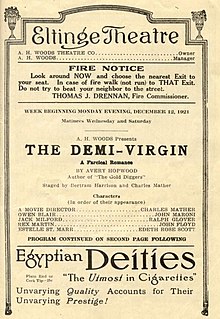| The Demi-Virgin | |
|---|---|
 Broadway program | |
| Written by | Avery Hopwood |
| Date premiered | October 18, 1921 |
| Place premiered | Times Square Theatre |
| Original language | English |
| Genre | Farce |
| Setting | Hollywood |
The Demi-Virgin is a three-act play written by Avery Hopwood. Producer Albert H. Woods staged it on Broadway, where it was a hit during the 1921–22 season. The play is a bedroom farce about former couple Gloria Graham and Wally Deane, both movie actors, whose marriage was so brief that the press speculated about whether Gloria was still a virgin. She attempts to seduce Wally when they are forced to reunite for a movie, but after playing along he surprises her by revealing that their divorce is not valid.
Because it contained suggestive dialogue and the female cast wore revealing clothes, the production was considered highly risqué at the time. The script alluded to a contemporary scandal involving actor Fatty Arbuckle, and one scene featured actresses stripping as part of a card game. Reviewers generally panned the play as unfunny and vulgar, and local authorities attempted to censor it. A New York City magistrate ruled the Broadway production was obscene, and obscenity charges were brought against Woods, but a grand jury declined to indict him. The city's Commissioner of Licenses attempted to revoke the theater's license, but this effort was blocked in court. Woods promoted the controversy to increase ticket sales, and the play was one of the most successful of the season. It had no long-term literary impact and was never published, but it did stimulate arguments over censorship of theatrical performances.